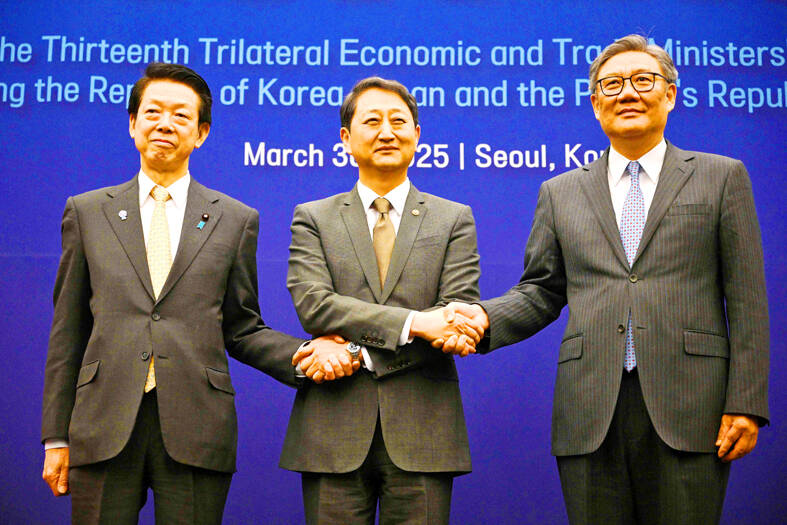China, South Korea and Japan yesterday agreed to strengthen free trade in the face of a raft of new tariffs imposed by US President Donald Trump.
The agreement came at a meeting of top trade officials — the first at that level in five years — days ahead of the start of tariffs on a huge range of US imports, including cars, trucks and auto parts.
South Korea and Japan are major auto exporters, while China has also been hit hard by US tariffs. The meeting was attended by South Korean Minister of Industry, Trade and Energy Ahn Duk-geun, his Japanese counterpart Yoji Muto, and Chinese Minister of Commerce Wang Wentao (王文濤).

Photo: AFP
The three countries called for their negotiations for a comprehensive trilateral free-trade agreement to be sped up, and agreed to create “a predictable trade and investment environment,” a statement said.
The three countries must respond “jointly” to shared global challenges, Ahn said.
“Today’s economic and trade environment is marked by increasing fragmentation of the global economy,” he said.
“The international environment surrounding us is constantly changing, and uncertainties are increasing,” Japanese trade official Yasuji Komiyama told a news briefing.
Ahn emphasized that protectionism was “not the answer” and urged efforts to ensure the WTO functions properly to “safeguard the stability and predictability” of global commerce, the South Korean trade ministry said.
Trump has promised tariffs tailored to each trading partner from Wednesday to remedy practices he deems unfair.
However, he also told reporters last week that there would be “flexibility,” and markets appeared to react with some relief at the end of last week.
Following the meeting between the three ministers, they also held bilateral meetings gatherings.
Muto said regardless of domestic “political circumstances in either country,” he hopes that exchanges and cooperation would continue with South Korea.

AGING: As of last month, people aged 65 or older accounted for 20.06 percent of the total population and the number of couples who got married fell by 18,685 from 2024 Taiwan has surpassed South Korea as the country least willing to have children, with an annual crude birthrate of 4.62 per 1,000 people, Ministry of the Interior data showed yesterday. The nation was previously ranked the second-lowest country in terms of total fertility rate, or the average number of children a woman has in her lifetime. However, South Korea’s fertility rate began to recover from 2023, with total fertility rate rising from 0.72 and estimated to reach 0.82 to 0.85 by last year, and the crude birthrate projected at 6.7 per 1,000 people. Japan’s crude birthrate was projected to fall below six,

US President Donald Trump in an interview with the New York Times published on Thursday said that “it’s up to” Chinese President Xi Jinping (習近平) what China does on Taiwan, but that he would be “very unhappy” with a change in the “status quo.” “He [Xi] considers it to be a part of China, and that’s up to him what he’s going to be doing, but I’ve expressed to him that I would be very unhappy if he did that, and I don’t think he’ll do that. I hope he doesn’t do that,” Trump said. Trump made the comments in the context

SELF-DEFENSE: Tokyo has accelerated its spending goal and its defense minister said the nation needs to discuss whether it should develop nuclear-powered submarines China is ramping up objections to what it sees as Japan’s desire to acquire nuclear weapons, despite Tokyo’s longstanding renunciation of such arms, deepening another fissure in the two neighbors’ increasingly tense ties. In what appears to be a concerted effort, China’s foreign and defense ministries issued statements on Thursday condemning alleged remilitarism efforts by Tokyo. The remarks came as two of the country’s top think tanks jointly issued a 29-page report framing actions by “right-wing forces” in Japan as posing a “serious threat” to world peace. While that report did not define “right-wing forces,” the Chinese Ministry of Foreign Affairs was

PREPAREDNESS: Given the difficulty of importing ammunition during wartime, the Ministry of National Defense said it would prioritize ‘coproduction’ partnerships A newly formed unit of the Marine Corps tasked with land-based security operations has recently replaced its aging, domestically produced rifles with more advanced, US-made M4A1 rifles, a source said yesterday. The unnamed source familiar with the matter said the First Security Battalion of the Marine Corps’ Air Defense and Base Guard Group has replaced its older T65K2 rifles, which have been in service since the late 1980s, with the newly received M4A1s. The source did not say exactly when the upgrade took place or how many M4A1s were issued to the battalion. The confirmation came after Chinese-language media reported